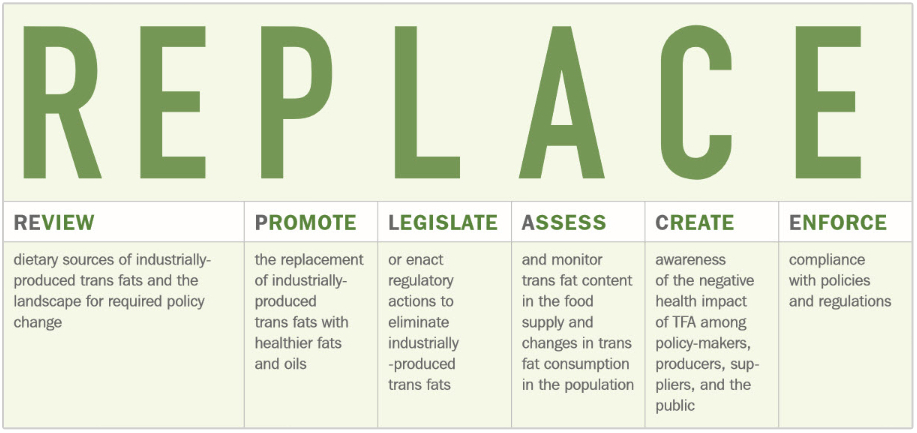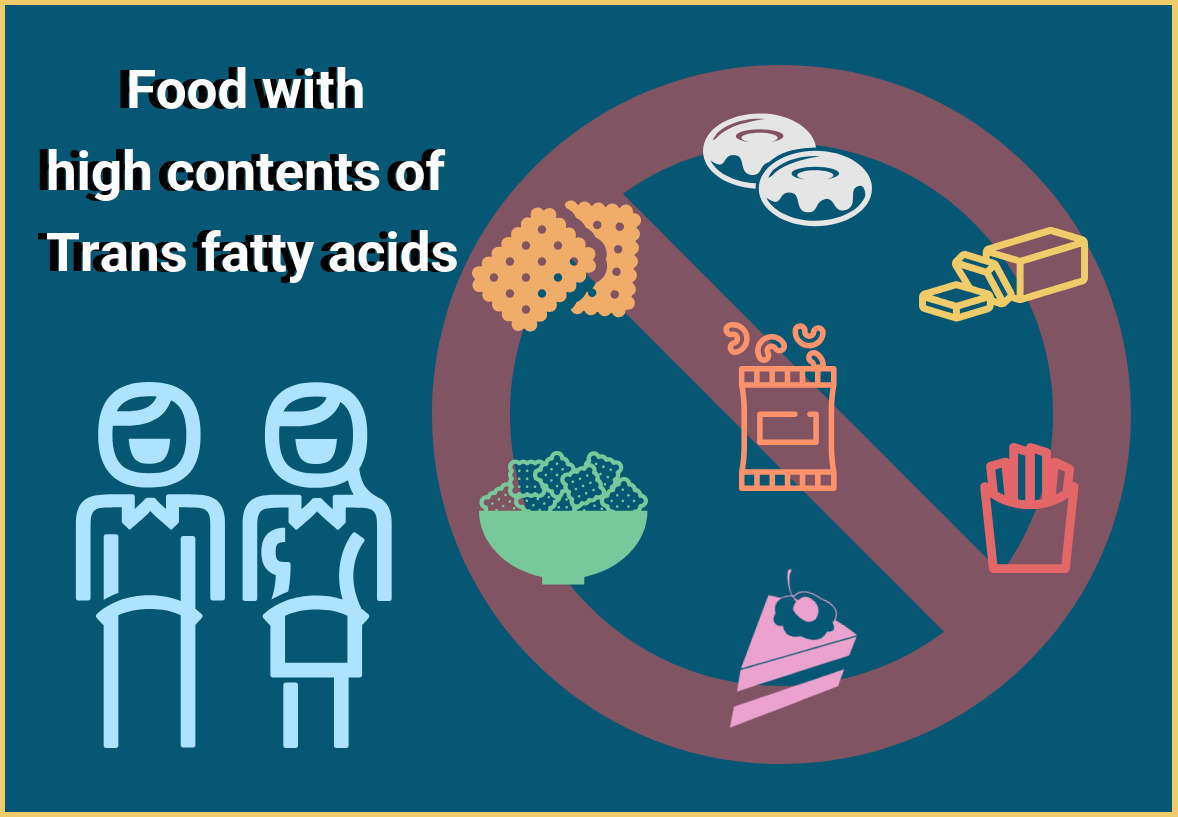The campaign to promote healthy food alternatives to reduce the risk of heart disease amid the coronavirus pandemic gathered steam with the filing of a House bill aimed at regulating trans- fat in food products in the Philippines.
The Trans Fat Free Philippines bill, also known as ‘An Act to Protect Filipinos from the Harmful Effects of Trans-fatty Acids (TFA),’ aims to regulate the manufacture, importation, distribution and sale of food products with high TFA content such as deep-fried food and commercially baked products.

Food rich in TFA. Photo from World Health Organization (WHO).
High intake of industrially-produced TFA contributes to 500,000 deaths globally from cardiovascular disease per year, according to the World Health Organization (WHO), which launched in 2018 a global campaign to eradicate trans-fats from food supplies by 2023.
“With the COVID-19 pandemic, one of the most susceptible (to the virus) are those with heart diseases and others such as hypertension,” said Congressman Ronnie Ong, one of the authors of the bill filed last July 29.
Congressman Alfred Delos Santos, co-author of the legislative measure, said “the bill can save millions of Filipinos” from death due to diseases linked to high consumption of TFA.
“Taking this step today is even more important in light of the recent serious threats to health that we are all facing,” he said during the online discussion organized by public interest law organization ImagineLaw to discuss the bill shortly after it was filed.
“Now, more than ever, we need to push for policies that will ensure that Filipinos are in their best of health so that we can fight through any challenge, be it a pandemic or any other.”
Ong said the bill will be introduced this month, adding he sees no problem getting support from his fellow congressmen and even from the Senate for the important measure.
“I don’t see any problem as TFA is a worldwide (concern),” he said while seeking the support of health officials and advocates. “Help us champion this bill that will make the next generation of Filipinos more healthy.”
The two congressmen are from the Ang Probinsyano Partylist.
“The DOH supports the filing of the Trans Fat Free Philippines bill as a way to unify and strengthen efforts to protect people from the harmful effects of TFA,” said Dr. Carmela Granada from the health department’s Disease Prevention and Control Bureau.
She said the DOH is finalizing a draft national policy which aims to eliminate harmful TFAs from Filipinos’ diet and food supply.
The health agency says cardiovascular disease (CVD), which is a result of TFA consumption and unhealthy diet practices, is the leading cause of death among Filipinos, accounting for 14.5 percent of deaths in the country in 2017.
“During this time of the COVID-19 pandemic, the importance of addressing the problem of CVD has never been more pronounced for patients with co-morbidities,” Granada said, referring to underlying or existing medical conditions that increase the risk and severity of COVID-19.
“As of June 8, almost half of COVID-19 deaths in the Philippines had co-morbidities and as an example, 60 pct of them had hypertension,” she said during the online forum.
Dangers in consuming TFAs
TFAs are formed when vegetable oils are chemically altered to stay solid at room temperature and prolong shelf life. These are called partially hydrogenated oils (PHOs).
These fats are found in common and accessible products, such as baked, fried and pre-packaged food. They are also present in margarine and food items such as donuts, cakes, biscuits and chips.
“It is the worst kind of fat we can eat,” Dr. Ivy Bolose-Nolasco of the WHO Philippines said in a pre-recorded message shared during the online forum.
“When we eliminate industrially produced (TFAs) in the diet, we decrease the risk of coronary heart disease and its consequent deaths. This reduction contributes significantly to the reduction in the number of premature deaths in the country due to NCDs (non-communicable diseases),” she added.
The estimated cost of NCDs to the Philippine economy is equivalent to PHP 756.5 billion or about 4.8% of the national gross domestic product, according to government data that is also reflected in the WHO’s 2019 report on Prevention and control of non-communicable diseases in the Philippines.
PH should not be dumping ground for TFA
“The most effective way to reduce TFAs in the food supply is implementation of legislation or regulatory actions to limit or prohibit industrially produced trans fatty acids,” Nolasco said, noting that mandatory policies have been enacted and now being implemented in 32 countries including industrialized states in Europe and Asia neighbors Thailand and Singapore.
“The global movement to eliminate TFAs is spreading…It is high time for us to follow suit and follow quickly,” she added.
Due to the ban on TFA-laden products in many countries, Nolasco warned that the Philippines risks becoming a dumping ground for these food items, like in the previous case in Thailand. “If we don’t pass our own legislation, there is a danger of this happening as well in the Philippines.”
Dr. Azucena Dayanghirang, Executive Director of the National Nutrition Council (NNC) said most of the country’s current efforts in reducing TFA in the diet is being done through the dissemination of nutrition messages as part of the promotion of healthy diets, the inclusion of TFA in food labels of packaged food products, as required by the Food and Drug Administration, and voluntary food reformulation by some food manufacturers.
The Trans Fat Free Philippines Bill, she said, is a welcome measure that seeks to promote and protect the health of Filipinos by “eliminating a harmful substance in our diet.”

REPLACE package. Photo from WHO.
The WHO launched in 2018 six strategic actions to eliminate industrially produced TFAs from the global food supply by 2023 under its REPLACE action package. Implementing the action plan is seen as a major victory in the fight against cardiovascular disease.
“First, we need to review…the resources that we have. Our resources should include the various stakeholders in the country,” Nolasco said, citing manufacturers, retailers, consumer groups and civil society organizations.
Healthier alternative to TFA
“We need to replace industrially produced TFAs with healthier oils and fats,” Nolasco declared. “WHO recommends that PHOs and products should be replaced with formulations that contain as little saturated fatty acids and as much unsaturated fatty acids as much as possible.”
A good example for an alternative to TFA is coconut oil, according to NNC’s Dayanghirang.
“While coconut oil is composed of 90% saturated fat, it behaves differently from saturated fat found in animal fat. Half the fat in coconut is rich in lauric acid, which accounts for why coconut oil is rapidly metabolized by the body for energy and contributes least to fat accumulation.”
Aside from virgin coconut oil (VCO) having antimicrobial properties, it also showed good progress in a clinical trial to check the effectiveness of VCO on COVID-19 patients.
Atty. Mary Grace Anne Rosales-Sto. Domingo, policy associate of ImagineLaw, said her team has already discussed with stakeholders, such as oil and food manufacturers, the problem with TFA and using alternatives whose cost is “quite minimal”.
“The estimate given to us is a few centavos per kilo. We have been informed that most food manufacturers are already using alternatives in the market because they export products in jurisdictions that prohibit food with PHOs or trans-fat,” she said.
Atty. Sophia San Luis, Executive Director of ImagineLaw, also said one of the features of the bill is that regulation for traditional markets, such as ambulant vendors, will not occur immediately upon enactment of the bill.
“The LGU (local government unit) would still have to issue an ordinance to regulate traditional market food service establishments. This gives an opportunity to study the impact of prohibition within their locality with particular consideration to the types of food sold in their market, in their locality,” she said.
The proposed transitory period is two years from the effective date of the Act.
The WHO’s global target for trans fat elimination in the food supply is 2023 and local advocates are hoping the bill just filed in Congress will result in something concrete.
“With regard to just the bill itself, we are working with Rep. Ong and Rep. Delos Santos. We hope we can make it before Congress ends in 2022,” said Rosales-Sto. Domingo.
There have been several bills on TFA reduction filed over a period of time but not one was enacted into law.
